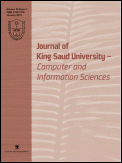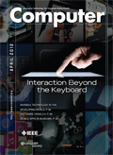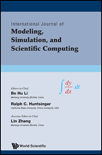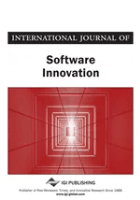
Human-centric Computing and Information Sciences
Scope & Guideline
Advancing Knowledge for a User-Centric Digital World
Introduction
Aims and Scopes
- Human-Computer Interaction (HCI):
Research in this area focuses on improving the ways humans interact with computer systems, including user experience design, accessibility, and usability studies. - Edge and Cloud Computing:
The journal extensively covers advancements in edge and cloud computing technologies, emphasizing their applications in various domains such as IoT, healthcare, and smart cities. - Security and Privacy:
A core focus is on developing secure systems that protect user data and privacy, particularly in the context of emerging technologies like IoT and blockchain. - Artificial Intelligence and Machine Learning:
The application of AI and machine learning techniques in solving complex problems across different fields, including healthcare, cybersecurity, and smart systems. - Blockchain Technology:
Research on blockchain applications, particularly in enhancing security, privacy, and data integrity in various domains, including healthcare and smart cities. - Data Analytics and Predictive Modeling:
Studies that utilize data analytics and predictive modeling to derive insights and facilitate decision-making in human-centric applications.
Trending and Emerging
- Federated Learning:
Recent publications indicate a surge in interest in federated learning approaches, particularly in healthcare and IoT contexts, emphasizing privacy-preserving data analysis. - Smart Cities and IoT Applications:
The integration of IoT technologies within smart city frameworks is increasingly prevalent, showcasing the journal's commitment to addressing urban challenges through innovative computing solutions. - Privacy-Preserving Technologies:
There is a growing focus on developing technologies that prioritize user privacy, including advanced encryption methods and privacy-preserving data sharing techniques. - Deep Learning for Real-Time Applications:
The application of deep learning techniques in real-time systems, such as video surveillance and healthcare diagnostics, is becoming a prominent theme, reflecting the demand for intelligent and responsive applications. - Sustainable Computing Solutions:
Emerging trends suggest a rising interest in sustainable computing practices and technologies, particularly in the context of cloud and edge computing, to address environmental concerns.
Declining or Waning
- Traditional Cybersecurity Approaches:
There appears to be a waning interest in conventional cybersecurity methodologies, as the focus shifts towards more integrated and advanced approaches, such as AI-driven security systems. - Basic Data Management Techniques:
The frequency of publications related to foundational data management techniques has decreased, possibly due to the growing emphasis on more complex and intelligent data processing frameworks. - Static User Interfaces:
Research on static or non-interactive user interfaces is diminishing, reflecting a broader trend towards dynamic, adaptive interfaces that enhance user engagement.
Similar Journals

Journal of King Saud University-Computer and Information Sciences
Elevating Academic Discourse in ComputingJournal of King Saud University-Computer and Information Sciences, published by ELSEVIER, is a prestigious open-access journal focusing on the rapidly evolving fields of computer science and information technology. Since its inception in 1996, this journal has provided a platform for high-quality research and innovative ideas, promoting the dissemination of knowledge to a global audience. With a remarkable impact factor and ranked Q1 in the Computer Science (miscellaneous) category as of 2023, it stands among the top 11% of journals in its field, reflecting its commitment to excellence and relevance. The journal proudly carries the ISSN 1319-1578 and E-ISSN 2213-1248, and it is based in Saudi Arabia while being part of a global academic network. With a Scopus rank of #26 out of 232 in general computer science, the Journal of King Saud University-Computer and Information Sciences is an essential resource for researchers, professionals, and students seeking to stay at the forefront of technological advancement. As it continues to thrive through 2024, it invites contributions that will shape the future of computing and information sciences.

Future Internet
Driving Knowledge Forward in the Realm of ConnectivityFuture Internet is a leading open-access journal published by MDPI, dedicated to advancing the field of Internet technologies and communication networks. Since its inception in 2009, the journal has provided a platform for rigorous research and innovative ideas in the context of the rapidly evolving digital landscape. Based in Switzerland, it has established itself as a prominent publication, earning a commendable Q2 ranking in the category of Computer Networks and Communications for 2023. With a Scopus ranking of #87/395 and a notable 78th percentile, Future Internet fosters interdisciplinary collaboration, making valuable contributions to the understanding of Internet systems, protocols, and applications. Researchers, professionals, and students alike will find a wealth of insightful articles addressing both theoretical foundations and practical implementations. The open-access format ensures that all readers have immediate and unrestricted access to high-quality research, facilitating knowledge dissemination and informed decision-making in academia and industry alike.

COMPUTER
Bridging Knowledge and Innovation in Computing.COMPUTER, published by the IEEE COMPUTER SOC, stands as a pivotal resource in the field of computer science, encompassing a broad range of topics and innovations within the industry. With an ISSN of 0018-9162 and E-ISSN 1558-0814, this esteemed journal features high-impact research articles that contribute significantly to the advancement of technology, demonstrating a prestigious Q1 classification in the Computer Science (miscellaneous) category for 2023. Positioned within the top percentile of Scopus rankings (ranked #84 out of 232), COMPUTER serves as an essential platform for sharing pioneering ideas and emerging trends that shape the future of computing. Although it does not currently offer open access, the journal's rigorous peer-review process ensures the publication of high-quality content. Researchers, professionals, and students alike will find invaluable insights into computer science developments from 1970 through 2024, making it a vital tool for anyone dedicated to this ever-evolving field.

MOBILE NETWORKS & APPLICATIONS
Connecting Theories to Practical InnovationsMOBILE NETWORKS & APPLICATIONS, published by Springer, is a leading journal in the fields of Computer Networks and Communications, Hardware and Architecture, Information Systems, and Software. With an impact factor that underscores its significance in the realm of mobile computing, this journal serves as a critical platform for disseminating cutting-edge research and innovative applications from both theoretical and practical perspectives. Established in 1996 and continuing until 2024, it has consistently ranked within the Q2 quartile across various computer science categories, highlighting its commitment to excellence and rigorous peer review. The journal's reach extends globally, providing valuable insights to researchers, professionals, and students alike. Notably, it occupies impressive ranks in Scopus, including 51st in Computer Networks and Communications and 26th in Hardware and Architecture, illustrating its high standing in the academic community. Engaging with this journal means accessing a wealth of knowledge that drives forward the rapidly evolving landscape of mobile networks and applications.

Journal of Grid Computing
Empowering Innovation in Grid TechnologiesThe Journal of Grid Computing, published by Springer, stands as a pivotal resource in the dynamic field of computer science, particularly within the realms of Computer Networks and Communications, Hardware and Architecture, Information Systems, and Software. With an impressive Q1 ranking across these categories in 2023, the journal exemplifies excellence and rigor, catering to a diverse readership from researchers to industry professionals. Established in 2003, this esteemed journal is anchored in the Netherlands and releases cutting-edge research that reflects trends and advancements in grid computing technologies. Researchers can gain insights through its vast contributions, while institutions benefit from its prestigious standing within the SCOPUS framework, boasting high percentile ranks in multiple computer science categories. Though not open access, the journal provides unparalleled access options for institutional subscribers, solidifying its importance as a gateway to innovative discoveries in high-performance distributed computing.

International Journal of Modeling Simulation and Scientific Computing
Empowering Research through Modeling and Simulation ExcellenceThe International Journal of Modeling Simulation and Scientific Computing, published by WORLD SCIENTIFIC PUBL CO PTE LTD, is a pivotal resource in the realms of Computer Science Applications and Modeling and Simulation. With an ISSN of 1793-9623 and an E-ISSN of 1793-9615, this journal serves as a platform for innovative and high-quality research from 2010 to 2024, contributing to the advancement of methodologies and applications in various scientific fields. Although currently categorized in the Q4 quartile for both recognized domains and positioned in the 42nd and 36th percentiles in the Scopus rankings for Mathematics and Computer Science respectively, the journal encourages scholarly exchange and fosters the integration of modeling and computational analysis in scientific research. Researchers, professionals, and students alike will find this journal an essential tool to stay updated with trends, methodologies, and cutting-edge findings in simulation and computational techniques that drive scientific inquiry today.

International Journal of Web Services Research
Unveiling Insights in Web Services TechnologiesThe International Journal of Web Services Research, published by IGI Global, is a premier forum dedicated to advancing research and innovation in the field of web services. With an ISSN of 1545-7362 and an E-ISSN of 1546-5004, this journal has steadily contributed to the discourse on computer networks, information systems, and software development since its inception in 2004. Based in the United States, the journal publishes high-quality research articles that delve into cutting-edge web service technologies and methodologies, making it an invaluable resource for researchers, professionals, and students alike. Although categorized in the Q4 quartile in 2023 across several classifications, its growing impact and relevance are reflected in its ongoing engagement with contemporary issues in the web services landscape. As an academic platform, it aims to provide a comprehensive understanding of the dynamics of web services and their implications for future technological advancements. Researchers are encouraged to contribute their findings to foster knowledge sharing and collaboration within this vital domain.

KSII Transactions on Internet and Information Systems
Fostering Innovation and Collaboration in Internet Research.KSII Transactions on Internet and Information Systems is a leading academic journal dedicated to advancing the fields of Internet technology and information systems. Published by the KSII-Kor Soc Internet Information, this journal has established itself as a significant contributor to research since its inception in 2007, with a focus on innovative solutions and methodologies in computer networks and communications as well as information systems. With a Category Quartile of Q3 in both fields for 2023, it ranks in the 44th percentile among its peers according to Scopus, making it a reputable platform for authors to share their findings. While available in print, the journal also promotes open access, ensuring broad dissemination of research findings. The editorial team is committed to maintaining high scholarly standards and relevance, inviting contributions from researchers, professionals, and students eager to push the boundaries of knowledge in today's rapidly evolving digital landscape. For those engaged in or studying these dynamic fields, the KSII Transactions on Internet and Information Systems remains an invaluable resource for cutting-edge research.

International Journal of Grid and Utility Computing
Pioneering Innovations in Grid and Utility ComputingInternational Journal of Grid and Utility Computing is a pioneering publication dedicated to advancing research in the domains of grid computing, utility computing, and their applications across various sectors. Initiated in 2005 and continuing through 2024, the journal is published by INDERSCIENCE ENTERPRISES LTD, a respected publisher known for its commitment to facilitating scholarly communication. With an ISSN of 1741-847X and an E-ISSN of 1741-8488, this journal, based in the United Kingdom, serves a global audience of researchers, professionals, and students. Although classified in the Q4 category across Applied Mathematics, Computer Science Applications, and Management Information Systems, the journal aims to bridge theoretical research with practical implementation, fostering interdisciplinary collaborations. Researchers looking for a platform to disseminate their work on grid technology and its utility in modern computing environments will find this journal an invaluable resource. The focus on innovative computing methodologies places it at the forefront of emerging trends and technology applications, despite the need for increased visibility in competitive metrics like Scopus rankings.

International Journal of Software Innovation
Driving Change Through Software Research and Collaboration.The International Journal of Software Innovation, published by IGI Global, serves as a crucial platform for disseminating cutting-edge research in the field of software engineering and innovation. With its ISSN 2166-7160 and E-ISSN 2166-7179, this journal has a broad scope that encompasses multiple areas of computer science, including Artificial Intelligence, Computer Graphics and Computer-Aided Design, Computer Networks and Communications, Software, and Computer Science Applications. Since its inception in 2017 and continuing until 2024, the journal has established itself in Q4 quartiles across various categories, reflecting both emerging trends and foundational principles in software innovation. Although it does not currently follow an Open Access model, its findings are vital for researchers, professionals, and students aiming to understand and contribute to the evolving landscape of software technologies. Located in the United States at 701 E Chocolate Ave, Ste 200, Hershey, PA 17033-1240, this journal not only offers research insight but also encourages collaboration and knowledge sharing among scholars worldwide.